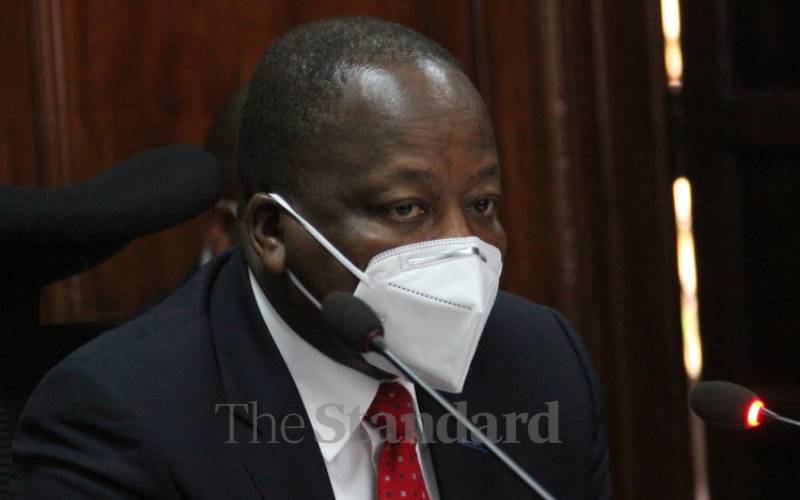
Health Cabinet Secretary Mutahi Kagwe before the Public Investment Committee (PIC) at Parliament Buildings, Nairobi. [David Njaaga, Standard]
Health Cabinet Secretary Mutahi Kagwe was yesterday put to task to explain why it took him long to react to a report by the National Treasury faulting Kenya Medical Supplies Authority (Kemsa) spending.
Appearing before the National Assembly Public Investments Committee (PIC), chaired by Mvita MP Abdulswamad Shariff Nassir, the CS was grilled to explain why he did not react immediately when he was seized of the report, which indicated that the ministry had surpassed the requisition budget.
The committee also wanted to know why it to took the intervention of Treasury to reveal how much the agency had spent despite the Health ministry having an alternate board member at Kemsa who should share reports with his CS.
READ MORE
Kagwe in the deep end of Kenya Kwanza mistrust, can he help?
Uhuru nominees face uphill task in delivering Mt Kenya to Ruto
The legislators wanted to know how the communication in the ministry works if indeed the health boss was in the dark concerning the issue despite his board representative constantly attending board meetings.
“Were you not briefed on what was happening in Kemsa despite having a representative, that is why Kenyans had to wait until the Treasury flagged off the expenditure issues?” posed Wajir East MP Amin Rashid Kassim.
Ali failed to understand why the ministry did not see all the rot at Kemsa and inform the members of the public on time.
He questioned whether the CS was interested and had proper consultations with his officers in matters coronavirus and guidelines of how to handle the situation.
Health Cabinet Secretary Mutahi Kagwe before the Public Investment Committee (PIC) at Parliament Buildings, Nairobi. [David Njaaga, Standard]
The lawmakers said they failed to understand why despite various board meetings, it never got to the CS’s attention that there was an issue and it had to take an insider to disclose exactly what was happening.
According to Kagwe’s submissions, the ministry knew about the matter by a letter faulting Kemsa for overspending.
The letter from the Treasury got to the ministry on June 22, 2020, and action was only taken after August 27. “Is it fair to Kenyans that six months down the line, the ministry was not aware of exactly what was happening at Kemsa?,” asked Mandera East MP Hassan Omar.
“I consider this as sleeping on your job. Since you waited for Treasury to flag off that there was an issue yet you are the right person to raise such issues,” charged Rashid. He added, “I consider that lack of leadership and governance from the CS.”
But in his response, the CS argued that it is not his role to oversight the parastatals that are run under him.
He maintained that his ministry cannot and did not micromanage Kemsa. “We only offer guidelines and policy structures from the ministry. Treasury monitors and that is why they pointed that out,” he affirmed.
He, however, acknowledges that there was a problem in Kemsa and the ministry is determined to make sure it becomes a better agency. “We are aware that we have problems and we will deal with it,” he promised.
Health Cabinet Secretary Mutahi Kagwe before the Public Investment Committee (PIC) at Parliament Buildings, Nairobi. [David Njaaga, Standard]
Kagwe was also under fire for insinuating that the losses Kemsa is experiencing are as a result of a decrease in product prices.
Kagwe disclosed that the agency owes Sh2.9 billion debt in supplies but said this will be settled once all the remaining products are sold and the remaining balance cleared.
“The prices of most products have now dropped due to an increase in supplies in the country. It is however not only Kemsa that increased their prices last year, other private institutions also hiked their prices. It was bound to happen and a lot of institutions will feel the same pain and incur the same losses,” he explained.
His response puzzled the chair, who said “By the time of audit, most of the products were still at the warehouses. Other state agencies in their submissions have indicated that there were able to buy the same items at lower prices and most opted not to buy from the Kemsa because their prices were way too high,” he noted.
”It’s a bit premature for us to say that the reason why we are making these losses is that the prices at the time were high. The loss is created by greed. Some suppliers were given regrets by Kemsa and they went and supplied the same items to third parties and Kemsa secured the same items from those parties,” added.

